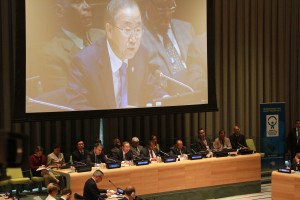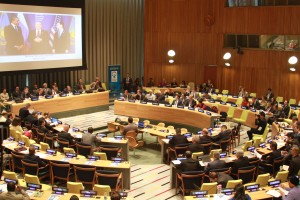NEW YORK – Top UN leaders, ambassadors from dozens of countries and a delegation from East Kazakhstan renewed calls for a total ban on nuclear-weapons testing at a special session of the UN General Assembly observing the International Day Against Nuclear Tests on Sept. 10.
 UN Secretary-General Ban Ki-moon, First Deputy Akim (Governor) of East Kazakhstan oblast Yermek Kosherbayev, UN High Representative for Disarmament Affairs Angela Kane, permanent representatives to the United Nations, other officials and civil society activists participated in the event.
UN Secretary-General Ban Ki-moon, First Deputy Akim (Governor) of East Kazakhstan oblast Yermek Kosherbayev, UN High Representative for Disarmament Affairs Angela Kane, permanent representatives to the United Nations, other officials and civil society activists participated in the event.
In 2009, the UN General Assembly unanimously passed a resolution proclaiming Aug. 29 International Day Against Nuclear Tests. Aug. 29 is the day in 1991 when the President of Kazakhstan, Nursultan Nazarbayev, shut down the Soviet nuclear test site at Semipalatinsk in eastern Kazakhstan by his decree. It also marks the date in 1949 that the Soviet Union tested its first nuclear weapon at the site, a test followed by 455 more over the following four decades.
Addressing the audience, the UN Secretary-General emphasised the importance of observing the day and praised the vision and courage shown by President Nazarbayev through his decisions to shut down the Semipalatinsk nuclear test site and renounce the nuclear arsenal Kazakhstan had inherited from the collapsing Soviet Union. Ban Ki-moon also shared personal impressions from his visit to the former test site in April 2010, when, standing near the epicentre of the first atomic explosion there, he called on the international community to bring a halt to nuclear testing. “If anyone of you goes there, you will have the same feeling and commitment which I am calling for,” he said.
Ban Ki-moon went on to urge more resolute action to achieve a world free of nuclear tests and nuclear weapons and specifically called on the states that have not yet signed or ratified the Comprehensive Nuclear Test Ban Treaty (CTBT) to do so without delay to make sure it enters into force as soon as possible.
In his remarks, Kosherbayev noted that Kazakhstan and President Nazarbayev made a most important contribution to the process of nuclear disarmament in the world. The world’s largest nuclear test site was closed 23 years ago by the decree of Kazakhstan’s head of state. The adoption of a resolution in 2009 declaring August 29 International Day Against Nuclear Tests has become the common contribution of the international community to reducing the global nuclear threat and implementing the CTBT, he said.
 He also noted serious consequences of the nuclear tests for people in eastern Kazakhstan, as well as the ecological damage done to the unique and diverse region of the country where the tests took place. Kosherbayev noted that the government of Kazakhstan has allocated more than $600 million for the rehabilitation of the region since 1999.
He also noted serious consequences of the nuclear tests for people in eastern Kazakhstan, as well as the ecological damage done to the unique and diverse region of the country where the tests took place. Kosherbayev noted that the government of Kazakhstan has allocated more than $600 million for the rehabilitation of the region since 1999.
Kazakhstan is grateful to the international community for its assistance in overcoming the consequences of nuclear tests, including the human and ecological rehabilitation of the region, Kosherbayev said. He listed major donors such as Japan, Norway, Russia, Switzerland, the United Kingdom and the United States, as well as regional organisations such as the European Union and the Organisation for Security and Cooperation in Europe (OSCE), and also noted assistance provided by aid agencies including the Canadian International Development Agency, the Korean International Cooperation Agency, the Red Crescent Society in Kazakhstan, UNICEF, USAID, the UNDP and the International Atomic Energy Agency (IAEA).
According to the Kazakh official, Kazakhstan calls on the states upon whose actions the CTBT entry into force depends to sign and ratify this crucial document as soon as possible. This will become one of the key steps in the effective implementation of the Treaty on the Non-Proliferation of Nuclear Weapons (NPT), the most important document on which the security of all mankind rests.
A high-level interactive panel discussion on the theme “The Path to Global Zero” took place as part of the General Assembly session. Speakers included Angela Kane; Geoffrey Shaw, representative of the IAEA Director General; Permanent Representative of the Philippines to the UN Libran Cabactulan; Permanent Representative of Canada to the UN Guillermo Rishchinsky and representative of the Women’s International League for Peace and Freedom Felicity Ruby. Permanent Representative of Nigeria to the UN Joy Ogwu moderated the discussion.
The session covered President Nazarbayev’s recent initiative, The ATOM Project, and its goal of galvanising global popular support for a full and complete legal ban on nuclear tests in the world and for the CTBT’s entry into force. Delegations voiced support for the timely campaign, which aims to draw the attention of global leaders to the threats and consequences of nuclear-weapons tests.
The discussion provided an opportunity for UN member states and invited guests from civil institutions to exchange views on various issues of nuclear nonproliferation and the need for the international community to achieve the ultimate goal of a nuclear-weapons-free world. Calling for the CTBT to enter into force, delegations specifically stressed the need for its prompt signature and ratification by the states listed in Annex 2 of the treaty: China, Egypt, India, Iran, Israel, North Korea, Pakistan and the United States. The CTBT, already signed by 183 states and ratified by 163, can only enter into force after it is signed and ratified by these specific eight countries.
